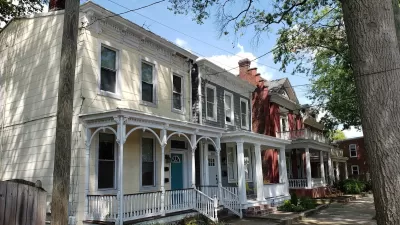Payments in lieu of taxes (PILOTs) are a popular new way for cash-strapped cities to add to their revenue by swapping voluntary payments from nonprofits for property taxes. The Lincoln Institute of Land Policy evaluates this novel practice.
Daphne A. Kenyon and Adam H. Langley, authors of the study, say that at least 117 municipalities have tried out a PILOT program since 2000.
Do PILOTs work? Kenyon and Langley conclude that yes, but it depends:
PILOTs "...have the potential to provide crucial revenue for municipalities that have a significant share of total property value owned by tax-exempt nonprofits, both as a stop-gap in the current municipal fiscal crisis and in the future. However, PILOTs rarely account for more than 1 or 2 percent of municipal revenues, so expecting these payments to eliminate local government deficits is unrealistic."
FULL STORY: The Municipal Fiscal Crisis and Payments in Lieu of Taxes by Nonprofits

Maui's Vacation Rental Debate Turns Ugly
Verbal attacks, misinformation campaigns and fistfights plague a high-stakes debate to convert thousands of vacation rentals into long-term housing.

Planetizen Federal Action Tracker
A weekly monitor of how Trump’s orders and actions are impacting planners and planning in America.

In Urban Planning, AI Prompting Could be the New Design Thinking
Creativity has long been key to great urban design. What if we see AI as our new creative partner?

King County Supportive Housing Program Offers Hope for Unhoused Residents
The county is taking a ‘Housing First’ approach that prioritizes getting people into housing, then offering wraparound supportive services.

Researchers Use AI to Get Clearer Picture of US Housing
Analysts are using artificial intelligence to supercharge their research by allowing them to comb through data faster. Though these AI tools can be error prone, they save time and housing researchers are optimistic about the future.

Making Shared Micromobility More Inclusive
Cities and shared mobility system operators can do more to include people with disabilities in planning and operations, per a new report.
Urban Design for Planners 1: Software Tools
This six-course series explores essential urban design concepts using open source software and equips planners with the tools they need to participate fully in the urban design process.
Planning for Universal Design
Learn the tools for implementing Universal Design in planning regulations.
planning NEXT
Appalachian Highlands Housing Partners
Mpact (founded as Rail~Volution)
City of Camden Redevelopment Agency
City of Astoria
City of Portland
City of Laramie





























